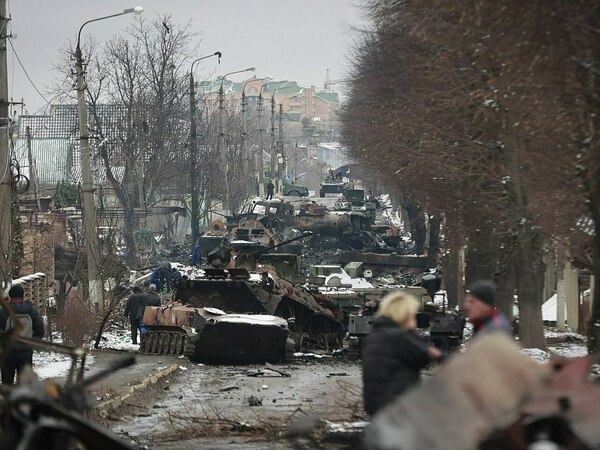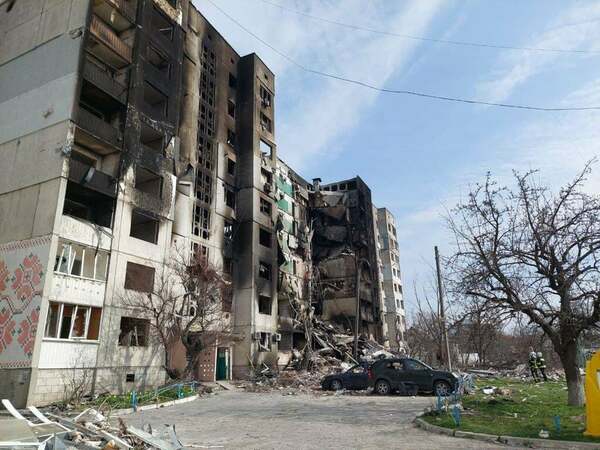
Anna Romandash is a Master of Global Affairs student in the Keough School of Global Affairs, and an award-winning journalist from Ukraine. A specialist in media monitoring, Anna has been surveying Western reporting on the Russian invasion of her native Ukraine. Here, she shares her perspective on the insidious nature of Russian propaganda and the need for vigilance in our media consumption.
A month of Russian invasion into Ukraine. A month of war in Europe. The news from Ukraine still dominates most Western media with pictures of devastation from the Russian attacks.
And there is plenty of devastation. In Mariupol alone, a port city in Ukraine’s south, Russian forces have blockaded civilians for weeks. On April 12, the city’s mayor Vadym Boichenko estimated that 21,000 people had died under siege and constant bombing and called the number of casualties “genocide.”
On Wednesday, March 16, Russian forces bombed a local theater, the basement of which was a shelter for hundreds of civilians. Prior to the attack, someone had written “дети,” meaning “children” in Russian, on both sides of the theater’s exterior in large letters that were clearly visible from the air. This attempt to stave off an aerial attack did not work. Fortunately, many of the people hiding in the theater’s basement survived the attack, but, as of March 25, the Marioupol mayor reported that 300 people had died in the attack, a figure that could still only be an estimate due to the continued bombardment of the area by Russian shells. Many of the survivors remained at the site for weeks after the attack as it was impossible to evacuate civilians due to the bombardment. To make matters worse, Russians are not allowing any humanitarian aid to reach the city and are even hijacking vehicles attempting to deliver help.
In addition to being an example of Russia’s senseless attacks on civilian targets, the bombing of the Mariupol theater represents something else: the cruel stupidity of Russian propaganda. Hours before the bombardment, the Russian government and state media claimed that the theater sheltered Azov, a Ukrainian volunteer militia that the Kremlin has labeled as Nazi. After the bombardment, the narrative changed: the Kremlin decided that Azov was not inside the theater, but actually carried out the bombing. At this point, the Russian media got confused. Some voices carried on with the story about bombarding Azov, and others persisted with the lie that Azov was the attacker.
Simply put, this propaganda is absurd. Yet, people still believe it. Millions of Russians trust ridiculous lies that make no sense. Why? They choose to do so. They support the war and their leader’s actions—even if they very well know that these actions are criminal. In an independent poll carried out by the Levada-Center in early March, two weeks into the invasion, nearly 60% of those surveyed supported the war against Ukraine. In late March, the same organization reported that, at 83%, Putin’s approval rating had only increased by 12% since before the invasion and was at its highest point since May 2018. Although some dismiss the accuracy of opinion polls in Russia today, the Levada-Center is well-regarded by external observers to the point that it has been declared a “foreign agent” by the Russian government.
The lie about unaware Russian civilians
This brings us to the first weapon in Russia’s propaganda arsenal and an important theme in the Russian narrative: a lie about pure, innocent, and unaware Russian civilians, an idea that is finding echoes in Western media. Hit hard by sanctions, the Kremlin wants the West to sympathize with ordinary Russians whose lives are affected by a declining economy. Russian propaganda is selling the idea that Russians do not know what is going on, and therefore do not deserve any sanctions for the war their country is waging against Ukraine.
But, is it plausible to argue that the entire Russian population is naïve and ignorant to what is happening in Ukraine? The media crackdown in Russia has always been half-hearted. Many Russians are very familiar with how to use a VPN that protects their internet connection and allows access to websites and information that might be blocked by their government. There are independent Russian-language media sources in and outside of Russia, and there were many more before the war. Social media platforms are also easily accessible with a VPN, so the bans on Facebook and other platforms imposed since the start of the war should not have had a tremendous effect on Russian users: they can still access information outside of the state media bubble if they choose to do so. Perhaps even more importantly, many Russians have family members in Ukraine who give them honest information on what is happening.
Only a tiny fraction of Russians speak against the war, and they are often ridiculed by their own neighbors, colleagues, and friends. In one month of war, around 15,000 Russians have been detained and fined across the country for protesting against Russian aggression. No major protest has yet to reach 10,000 attendees. Against the fact that Moscow alone is a city of nearly 12 million people, the proportion of Russians actively protesting this war is tiny. In reality, it appears that most Russians are content to believe the disinformation. They may distance themselves from the war or think it does not concern them, or they may even support it—but the idea that the majority would oppose the war if they had better access to information about their country’s assault on Ukraine is simply more propaganda.
It is true that even peaceful rallies in Russia are difficult to organize—unless they support Putin’s government—but when citizens fail to protest against the things they oppose, they are simply giving their government a pass to keep doing what it wants. When citizens embrace their leaders’ propaganda, that gives the government even more license to act with impunity. There are even those who compare sanctions against Russia with the Holocaust, equating their treatment with that of the Jewish victims of Nazi atrocities, and describing the criticism of their support for Putin as Russophobia. In recent weeks, we have even seen much evidence of support for Putin among Russians living elsewhere in Europe. These people have access to actual verified information and they still support the war, even carrying the symbol “Z,” a Russian pro-war symbol.
In other words, people believe what they choose to believe. Events over the last month have shown that, for most Russians, the choice is clear.

In this war, language matters
A second Kremlin propaganda tactic exerting an influence on Western discourse is the manipulation of language. In this war, language matters.
The Kremlin does not want the word “war” to be applied to its attack on Ukraine, and forbids the word in the Russian media and even in personal use. This avoidance of the word “war” is even evident in European and other international media reports that refer vaguely to a “Ukraine crisis,”or “Ukraine conflict,” downplaying the reality of a situation in which Russia is clearly the aggressor. They also persist in saying “THE Ukraine,” including an article, still used by the Kremlin, that harks back to a time when Ukraine was part of the USSR and not an independent nation. These, and other descriptions and phrases repeat the manipulative language of Russian propaganda, denying the reality of Ukrainian sovereignty and its violation by the Russian Federation.
In a third strand of Russian propaganda, the Kremlin articulates bizarre justifications for the war in ways that lead the international media to repeat its false narratives. While the Western media might acknowledge that these justifications do not make sense, in the rush to disprove Russia’s claims, it repeats the same words and narratives from propaganda. One example is recent reports on Fox News about U.S.-funded “biolabs” in Ukraine.
The media persists in quoting Putin, Foreign Minister Sergey Lavrov, and other Russian officials knowing very well that they lie. This gives those leaders a voice and a platform to communicate their messages, even though officials who lie are not a credible source of information. By giving a platform to liars, many journalists think they are balancing their information with two sides. Yet, it is not a reliable balance when one side is justifying war and genocide.
Russian propaganda is ukrainophobic
The final way in which we see Russian propaganda affecting reporting and thinking on this war is a tactic that has been in use for years. Russian propaganda is ukrainophobic, to the extent that it has normalized and spread ukrainophobia very successfully to the rest of the world. On this point, too many Western “experts” and journalists display zero knowledge of the broader historical and cultural context.
For example, Russian propaganda questions whether Ukraine is a real country, and if Ukrainians are actually a nation. It persists in describing Ukraine as a Soviet territory that should be reunited with Russia. In response, many Westerners start scratching their heads and using Russia-backed sources to find the answers.
A very common narrative from Putin’s supporters and their sympathizers is that since many Ukrainians speak Russian, they are all Russians. This ignores the context that explains why many people in Eastern Europe speak Russian, a reality that is the result of Russia’s history of colonizing many countries and oppressing various nations, first by the Russian Empire, and then by the Soviet Union.
Many Western “experts” wonder whether Ukraine had independence at any time before 1991. Again, such suggestions fail to take account of historical context. Yes, Ukraine had its own state after the First World War, and yes, the Soviet Union crushed it, just as they suppressed independence and resistance movements during and after the Second World War, and as the Russian Empire had suppressed resistance to its absolutist rule.
Russian propaganda is colonial and imperialist. It exploits ignorance, uses manipulation and lies, and is repeated so often that people start to believe it. Even those who may not fully believe a particular piece of propaganda will vaguely remember hearing it somewhere, thus adding some credibility to this false messaging.
How can we combat propaganda and its spread? Our most powerful defense is to understand how narratives work, educate ourselves, and verify information through not one, but a few credible sources.
The mission of Russian propaganda is extreme: it aims to convince us that everyone lies. If pro-Kremlin media is deemed untrustworthy, Russian propaganda wants to sow doubt about the trustworthiness of pro-Ukrainian sources. But after one month of Russian aggression, even the concept of being “pro-Ukrainian” should no longer exist. Impartiality in this war is equivalent to supporting the aggressor who invaded without provocation. You can either seek justice and truth, or you can agree that a bully can keep on bullying with impunity.
In the case of the Russian invasion of Ukraine, bullying grew into a full-scale war, one that carries all the elements of genocide. The truth can stop this catastrophe, but first, you need to know it, and then, you need to use it.
About the Author

Anna Romandash is a Master of Global Affairs student in the Keough School of Global Affairs, majoring in International Peace Studies. She is an award-winning journalist from Ukraine, who has worked as a reporter and digital policy expert focusing on sustainable media development, human rights, and information access. Romandash was named Media Freedom Ambassador of Ukraine for her human rights and media work and is the recipient of a Kroc Institute Fellowship.
Image Credits
Top: Russian military weapons destroyed and seized by the Armed Forces of Ukraine, near Bucha, March 1, 2022, Wikimedia Commons.
Bottom: Borodianka After Russian Shelling, 08 April 2022, State Emergency Services of Ukraine, Wikimedia Commons.